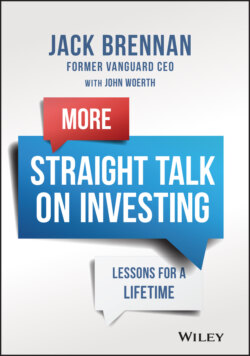Читать книгу More Straight Talk on Investing - John J. Brennan - Страница 29
Trust the Financial Markets
ОглавлениеThe second dimension of trust is having confidence that your investments in the financial markets will grow time over time. An expanding economy generally means more jobs, higher incomes, and increased opportunities for businesses to earn profits. And increased profits will ultimately raise stock prices, producing gains for investors. Personally, I believe that the U.S. economy will continue to grow over the long run, as it has in the past. While any economy will have ups and downs, the U.S. economy is the envy of the world because of its resilience and its ability to adapt and grow over the years. Over the long term, economic growth has averaged 3.1% a year over and above the rate of inflation.
As shown in Figure 2.1, there have been many peaks and valleys in the growth of the global stock markets, but the general direction has been upward, as measured by two common stock market benchmarks: the Standard & Poor's 500 Index (a proxy for U.S. stocks) and the MSCI EAFE Index (a proxy for international stocks). A $1 investment in the S&P 500 Index on December 31, 1969, would have been worth $153.64 as of December 31, 2019, assuming dividends were reinvested. The same $1 investment over the same time period in the MSCI EAFE Index would have a value of $86.45, assuming dividends were reinvested.
People tend to forget that long-term upward trajectory when the market has one of its periodic downturns. Conversely, when the market spends a year or two doing notably better than its historical average, people tend to become euphoric and forget that a downturn is sure to come at some point. That's just human nature.
Figure 2.1 Growth of $1 in U.S. and International Stocks (1970–2019)
Sources: Morgan Stanley Capital International (MSCI), Standard & Poor's
This behavior came to the fore shortly after I was named CEO at Vanguard in 1996. The market went on an extraordinary surge (up 166% from December 1995 to September 2000) in a continuation of a bull market that started in the early 1990s. With such a prolonged period of gains, investors become infatuated with the stock market and investing. The ardor dissipated quickly when the market came back to earth with the bursting of the so-called tech bubble. Stocks fell 49% and didn't turn around for another two years. It was a painful, but instructive, period.
Despite periodic setbacks, the historical trend suggests that you'll be rewarded if you invest in the stock market. But there is no guarantee, of course. You shouldn't put your money in stocks if you don't share the belief that the economies around the world will continue to grow over the coming decades. Without growth in productivity and innovation in the products and services in our collective economies, there will not be good returns on stocks, and corporate bonds will prove risky. Instead, put your money in the bank and collect a guaranteed return, or buy U.S. Treasury bills, the safest debt instrument in the world. Recognize that you'll have to be content with very modest returns that may not keep ahead of inflation. Remember the trade-off: Lower-risk investments (i.e., ones that possess price stability) cannot be expected to reward you as well as riskier ones (i.e., ones that possess price volatility).
